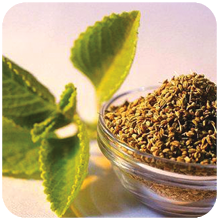
Trachyspermum ammi known as ‘ajwain’ is grown in western India. It is cultivated in arid and semi-arid regions where soils contain high levels of salts. Ajwain is an annual plant abundantly branched, 60-90 cm tall. The stem is striated; inflorescence is umbel composed of 16 umbele, each containing up to 16 flowers. The flowers are actinomorphic, white, male and bisexual, corolla 5 petals biloba. Fruit consists of two mericarps, Fruit is gray brown in color, ovoid, compressed, about 2 mm long and 1.7 mm wide, has 5 crests and 6 vitae in each mericarp. Fruits (seeds) are used for medicinal purposes.
Chemical composition – Ajwain seeds contain fiber, carbohydrates, tannins, glycosides, proteins, fats, saponins, flavones and mineral like calcium, phosphorus, iron and niacin. Fruits produce 2% – 4% brown colored essential oil with thymol as the major constituent. Nonthymol fraction (thymene) contains p-cymene, γ-terpenine, and β-pinene α- dipentene, α-terpinene, and carvacrol. Small amounts of camphene, myrcene, 3-α -carene, have also been found in plants. Fruits also contain flavones yellow crystalline substance such as steroids, also contains 6-O-β-glucopyranosyloxythymol, glucoside and resins containing 12% volatile oils (thymol, γ-terpinene, p-cymene, and α- and β- pinene). The main components of T. ammi oils are carvone, limonene, and dilapiol.
Properties – Antimicrobial, hypolipidemic, stimulant, digestive, antihypertensive, hepatoprotective, antispasmodic, bronchodilator, antilithiasic, diuretic, galactogogue, antiplatelet, diaphoretic, anti-inflammatory, antitussive, nematocide, anthelmintic, detoxifier.
Recommendations – Cold, cough, flu, asthma, diarrhea, colic, anorexia, cholera, colic, indigestion, bloating, edema, arthritis, rheumatism.
This plant is incorporated in natural remedies GASCURE Syrup, GASCURE Tablets, WORM END Syrup, NON DOLOR.




